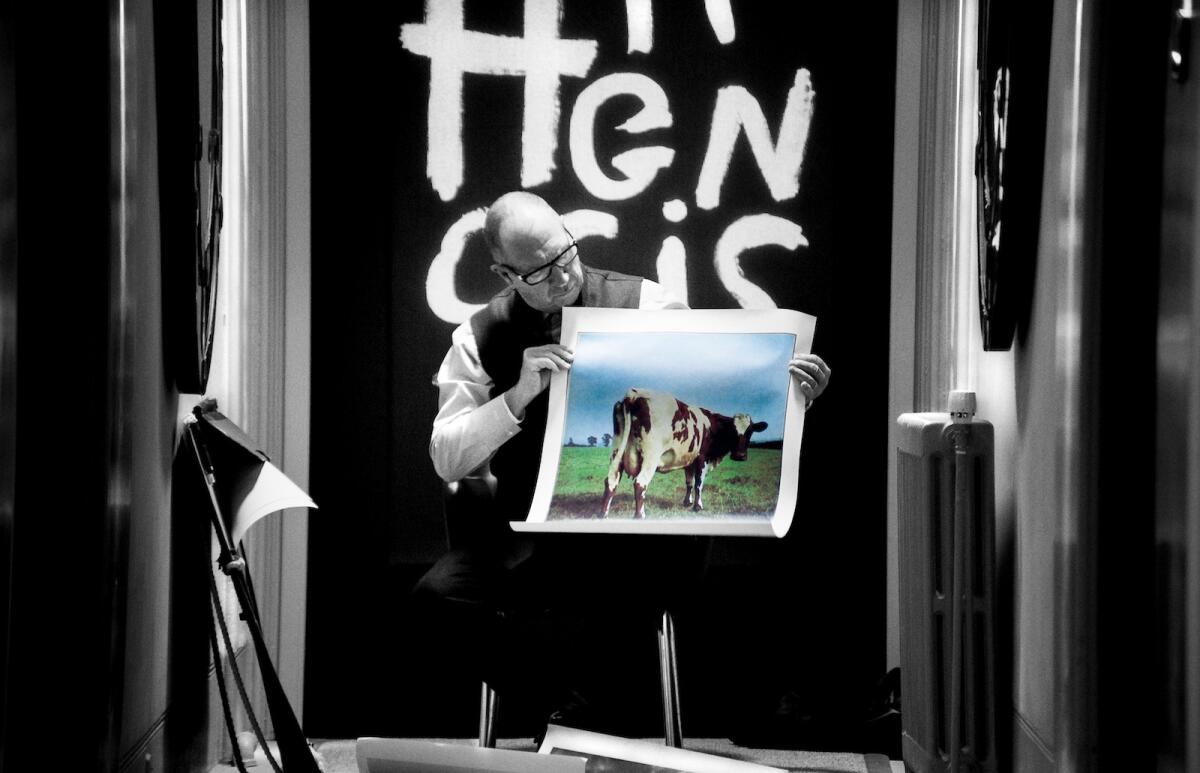Remember when rock album art was legendary? ‘Squaring the Circle’ celebrates the form

- Share via
In the vinyl heyday, record-buying was a thrilling process. You rushed home, got the plastic off, let that waxy disc slide carefully out so it met your thumb at the edge and middle finger at the spindle hole. (Don’t smudge it!) But once the warm analog sounds of your favorite band (or new discovery) wafted from your speakers, that cardboard sleeve wasn’t tossed aside. You stared at that cover and drank in the album art, especially when it didn’t show the artist. What did the image mean?
Maybe nothing, maybe everything, according to Anton Corbijn’s highly entertaining documentary “Squaring the Circle (The Story of Hipgnosis),” which traces the impact of the beautifully confounding rock album cover — Pink Floyd’s star cow (“Atom Heart Mother”), Wings’ cheeky jailbreak (“Band on the Run”), Led Zeppelin’s mystic, tinted children (“Houses of the Holy”) — to the disruptive, sought-after British design outfit Hipgnosis: idea man Storm Thorgerson and photographer Aubrey “Po” Powell.
The movie makes a convincing case that in the counterculture era between the first wave of portrait-centered LP covers and the early ’80s music video explosion, Hipgnosis wase as responsible as anyone in making visual creativity an iconographic extension of a given rock artist’s image and sound. As Oasis frontman and interviewee Noel Gallagher aptly puts it, vinyl was the poor man’s art collection, the kind stacked on the floor instead of hung on the walls. (Gallagher also amusingly grouches about how covers have been reduced to phone-screen thumbnails, but with vinyl once more the music industry’s bestselling physical output, the time couldn’t be better for a look back like “Squaring the Circle.”)
Led by Taylor Swift and Adele albums, sales of vinyl LPs skyrocketed in 2021. But demand continues to exceed supply, and pressing plants are booked.
Cambridge friends Powell (the most prominent original interviewee) and Thorgerson (who died in 2013 and is seen primarily in archival footage) started their studio in the free-thinking, drug-fueled, art-for-art’s-sake haze of the late ’60s. Through flatmate Syd Barrett came the connection that sparked a longstanding, reputation-forging relationship with cosmic prog-bards Pink Floyd, starting with the psychedelic cover for “A Saucerful of Secrets,” then the meaningless provocation of “Atom Heart Mother,” and perhaps their most iconic work, the prismatic triangle in space for “The Dark Side of the Moon,” this year celebrating its 50th anniversary as a concept-rock touchstone.
As their cachet soared in the ’70s, Thorgerson and Powell could dictate to bands what the cover was, not the other way around. The price was steep, the ideas outlandish, and their working methods chaotic — mostly because Thorgerson’s volatile mix of crabbiness and insecurity rubbed everyone the wrong way. But the uncompromising results galvanized a music industry in the grip of genius, excess and art-minded audiophiles.
Paul McCartney clarifies that ‘nothing has been artificially or synthetically created’ in new Beatles song that incorporated AI technology to enhance John Lennon demo tapes.
When Peter Gabriel — who, as with all the marquee interviewees, from Paul McCartney, Roger Waters and David Gilmour to Robert Plant and Jimmy Page, is framed in shadowy black-and-white — said he wanted to both be on the cover and not be on it, the duo could translate that into evocative gold: the stunning raindrops-on-a-car image that immortalized Gabriel’s solo debut album.
Directing his first documentary feature, Corbijn, a longtime music photographer who made the Joy Division docudrama “Control,” is well suited to this material’s creative highs and human dimensions. Powell is a gracious and emotional raconteur, while the clients’ and colleagues’ observations feel candid and wistful. And as you might imagine, the archival clips and needle drops of memorable tunes sweeten the package (save the curious repetition of Strauss’ “Blue Danube”).
From the rich tales behind some legendary album art (“Wish You Were Here,” “Houses of the Holy,” “Animals”) to the warts-and-all business saga of a hotshot collective struggling with fraying personalities, industry egos and, eventually, changing times, “Squaring the Circle” is catnip for a music lover of a certain age with a treasured cache. Not that the Spotify generation can’t enjoy it, but one could see an affable viewer warning applied here, borrowed from theme park language: You may need to be older than [blank] to enjoy this ride.
'Squaring the Circle (The Story of Hipgnosis)'
Not rated
Running time: 1 hour, 41 minutes
Playing: Starts June 16, Laemmle Royal, West Los Angeles
More to Read
Only good movies
Get the Indie Focus newsletter, Mark Olsen's weekly guide to the world of cinema.
You may occasionally receive promotional content from the Los Angeles Times.











